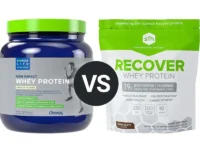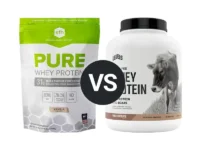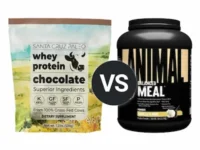Knowledge BaseYou're Questions Answered
Is raw protein powder better for you than other types of protein powder?
There is no clear evidence suggesting that raw protein powder is better than other types of protein powder. While raw protein powder is minimally processed, and some people may prefer it for that reason, the processing methods used to produce other types of protein powder do not necessarily make them less healthy or less effective for muscle building.
The quality of any protein powder, including raw protein powder, is determined by its amino acid composition, bioavailability, and digestibility. Protein quality is typically measured by the protein digestibility-corrected amino acid score (PDCAAS), which takes into account both the amino acid profile and digestibility of the protein. Many types of protein powder, including whey, casein, egg, and plant-based proteins, have been shown to have high PDCAAS scores and are effective for muscle building and recovery.
It is important to note that the term "raw" is not a regulated term, so the processing methods used to produce raw protein powders can vary widely between brands. Some raw protein powders may be minimally processed, while others may undergo significant processing before being marketed as "raw." Additionally, raw protein powders may contain higher levels of bacteria and other microorganisms due to the lack of pasteurization or sterilization during processing, which could be a concern for individuals with compromised immune systems.
Overall, the choice between raw protein powder and other types of protein powder is largely a matter of personal preference. Both types can be effective for muscle building and recovery, and the quality and effectiveness of a protein powder is determined by its amino acid profile, digestibility, and bioavailability.
- Hoffman JR, Falvo MJ. Protein - Which is Best? J Sports Sci Med. 2004;3(3):118-130.
- Joy JM, Lowery RP, Wilson JM, et al. The effects of 8 weeks of whey or rice protein supplementation on body composition and exercise performance. Nutr J. 2013;12:86. doi:10.1186/1475-2891-12-86
- Gilani GS, Sepehr E. Protein digestibility and quality in products containing antinutritional factors are adversely affected by old age in rats. J Nutr. 2001;131(8):2199-2205. doi:10.1093/jn/131.8.2199
- Clifford T, Bell O, West DJ, Howatson G, Stevenson EJ. The effects of beetroot juice supplementation on indices of muscle damage following eccentric exercise. Eur J Appl Physiol. 2016;116(2):353-362. doi:10.1007/s00421-015-3290-x.

Your Answer
We are a participant in the Amazon Services LLC Associates Program, an affiliate advertising program designed to provide a means for us to earn fees by linking to Amazon.com and affiliated sites.


